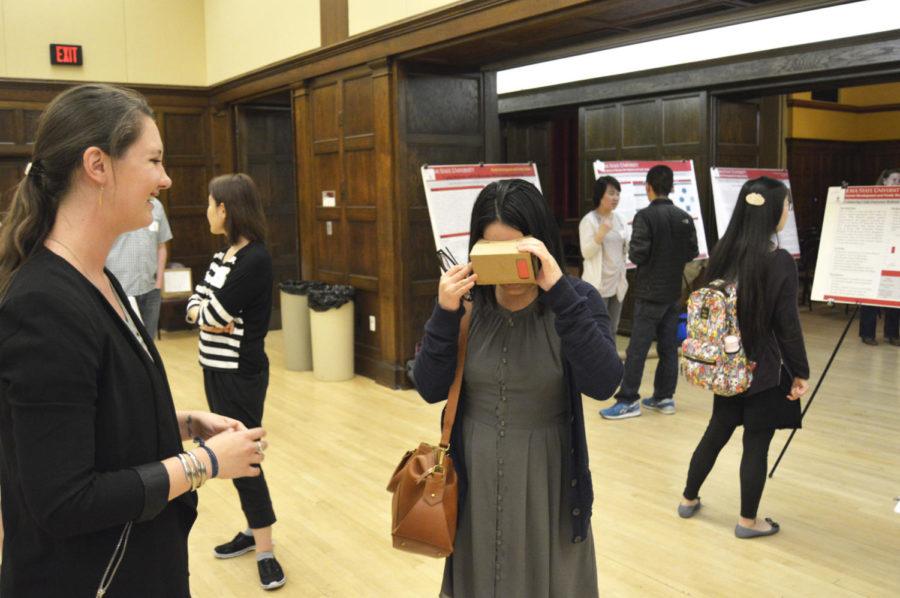GPSS conference prepares students for life after graduation
Matthew Rezab/Iowa State Daily
Chen Zhang, graduate student in graphic design, tries out Google Cardboard at Laura Huisigna’s poster booth Thursday afternoon at the GPSS Research Conference in the South Ballroom. Google Cardboard allows users to turn their smartphone into a virtual reality machine. Huisinga’s research focuses on how virtual reality can be used in the classroom.
April 2, 2015
Research, networking and career building were all major themes for the graduate students at the second annual Graduate and Professional Student Research Conference at the Memorial Union on April 2.
The conference held sessions with faculty and professionals throughout the day to help students learn to résumé-build, write research and teaching statements, create effective research posters and help guide Ph.D. students into fields other than academia.
Arko Provo Mukherjee, president of GPSS, said the conference is designed to help students become more comfortable and effective when they attend conferences away from Iowa State.
“We want them to hone their networking skills,” Mukherjee said. ” I’m hoping this conference will give students an opportunity to do that.”
Most graduate students are just working on a single project because research is focused — that makes it easy to forget about the bigger picture, Mukherjee said.
On top of the various workshops sessions, attendees were invited to present their research orally, give poster presentations and, perhaps the highlight of the day, shrink thesis presentations down to three minutes.
“Those three minutes go by really, really fast,” said Cayla Taylor, a post-doctorate in agricultural education.
The poster, three-minute thesis and oral presentations also served as competitions with a total of $2,200 awarded to the winners.
The conference was sponsored by the Office of the Senior Vice President and Provost, GPSS and each college on campus. Jonathan Wickert, senior vice president and provost, was in attendance as a judge for the three-minute thesis competition.
“I think this is a really important conference because it’s put on by students for students,” Wickert said. “It raises the visibility of research on campus.”
Wickert said he thinks giving students the chance to practice presenting research in front of an audience is an opportunity students should take advantage of.
“Doing the research is one thing, but making people aware of it is another,” he said. “Being able to communicate that research to people is important.”
The research conference was organized by co-chairs Ruchir Goswami and Misty Spencer. The team has been working since last year’s conference ended to make sure this year’s event would go off without a hitch. GPSS recently added a full-time executive position, whose entire responsibility is organizing the event in the future.
The conference was moved to the Memorial Union this year to accommodate more demand. A total of 450 people were pre-resgistered, but Goswami said there were many registrants that morning.
“They have done an awesome job,” Mukherjee said. “This is only a one-day event, but it requires year-round planning.”
Goswami and Spencer were responsible for bringing in keynote speakers, judges, faculty and professionals to the conference, as well as creating the framework for submitting proposals and selecting which proposals the conference was able to accommodate.
Career Services coordinator Karin Lawton-Dunn held a résumé-building session to help students get a leg up in their professional careers. Lawton-Dunn, who is available exclusively to graduate students, said networking at conferences can make the difference in landing a job. She also gave some candid advice to anyone building a résumé.
“It’s OK to get lots of input,” she said. “A clueless 10 year old should be able to understand your résumé.”
This year’s conference featured two keynote speakers. Peter Freeman, founding dean of the College of Computing at Georgia Tech, spoke to students about “The Future of Computing” in an afternoon session and author Adam Ruben lightened things up to close out the conference with his lecture, “Surviving Your Stupid, Stupid Decision to Go to Grad School.”







